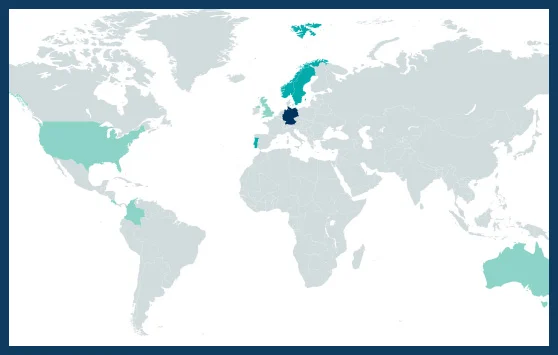01/04/2021 – 31/03/2024
€ 903,297
Sonia Bejarano
sonia.bejarano@leibniz-zmt.de
Coordinator: Reef Systems – Leibniz Centre for Tropical Marine Research – Bremen – Germany
Arts, Law and Education & Centre for Marine Socio-ecology – University of Tasmania – Hobart – Australia
Biological, Earth & Environmental Sciences – University of New South Wales Sydney – Sydney – Australia
ECOMARES Foundation, Universidad del Valle – Cali – Colombia
Climate – Norwegian Research Centre – Bergen – Norway
MarViva Foundation – San José – Costa Rica Applied Molecular Biosciences (UCIBIO) – Universidade Nova de Lisboa – Almada – Portugal
Stockholm Resilience Centre – Stockholm University – Stockholm – Sweden
Lancaster Environment Centre – Lancaster University – Lancaster – United Kingdom
Geography – University of Hawai’i at Mānoa – Honolulu – United-States of America

Species are “on the move” throughout the planet escaping hostile climatic conditions. These movements have advanced four times faster in the ocean than on land, causing dramatic ecosystem changes and redistributing resources across borders. The ecological, food security, and governance implications are obvious. Yet, two persistent gaps hinder our capacity to effectively manage coastal social- ecological systems to safeguard both fisheries and human wellbeing in the face of such challenges: i) regional studies documenting recent species redistributions have not quantified the societal repercussions, and ii) future projections have mapped expected catches and metrics of socio-economic impact (e.g. fisheries revenue) globally and at coarse resolutions, unfitting to support local or regional decision-making. Fish redistributions are particularly concerning, as three billion people depend on them for 15% of their animal protein intake and essential nutrients to tackle malnutrition. Although fish range shifts should be urgently investigated in the Global South, studies have focused disproportionately on wealthy parts of the world.
EASMO will investigate for the first time the impact of climate change on the distribution of reef fish throughout the Eastern Tropical Pacific Ocean (ETP) considering cascading effects on biodiversity, ecosystem function, reefs’ contributions to people, climate feedbacks, and socio-economic wellbeing. Ultimately, it will deliver several layers of new scientific knowledge that can be directly integrated into decision-making tools, support adaptive transboundary governance approaches, and propel actions for meeting the UN Sustainable Development Goals 2 Zero hunger, 13 Climate action, and 14 Life below water.
EASMO will undertake four overarching activities:
• First, EASMO quantifies climate and ocean changes in the ETP for the past 20 years, and forecast changes expected by the mid-21st century under two greenhouse emissions scenarios, revealing the driving mechanisms. We use the Coupled Ocean-Atmosphere-Wave-Sediment Transport modelling system to model contemporary and future atmospheric, oceanographic, and biogeochemical characteristics at high spatio-temporal scales, relevant for management of local impacts and ecosystem services.
• Second, the project uncovers whether reef fish will adapt to shifting climatic conditions in the ETP, or shift their distribution range to escape them, and investigate how range shifts i) cascade onto the benthos, and ii) redistribute fish biodiversity, ecosystem function, and potential catch characteristics among Exclusive Economic Zones.
• Third, EASMO reveals how societies react to emerging climate and reef fish catches. Solidly engaged with stakeholders and policy-makers, we examine collaboratively whether and how existing governance arrangements that support fisheries management should be reformed to safeguard food security in the face of emerging catch structures and societal behaviours.
• Fourth, the project translates our scientific outcomes into policy and public awareness integrating local stakeholder representatives, resource users (e.g. fishers), and conservation organisations at the national, regional, and global scales (e.g. Conservation International, World Wide Fund for Nature, Wildlife Conservation Society). To this aim, we will not only publish and disseminate scientific papers and policy briefs (in Spanish and English), but also lead regular stakeholder engagement and advisory workshops, co-produce audio-visual material, and remain active in the web and social media.